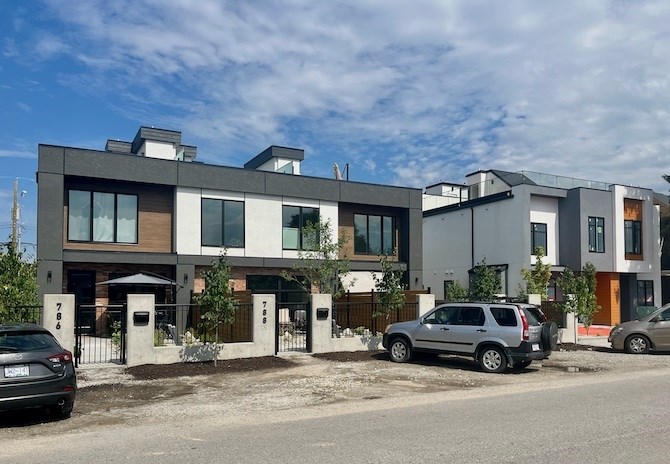Trees or homes? Central Okanagan politicians need to focus on housing crisis
Dan Winer has high praise for the efforts of City of Kelowna staff in dealing with the shortage of housing in the city.
But the executive officer of the Canadian Home Builders' Association of Central Okanagan doesn’t speak so kindly of the people elected throughout the region, including Kelowna councillors who commented on a staff presentation last week about expanding the number of single-family lots where fourplexes can be built without rezoning.
READ MORE: Kelowna is doubling down on fourplexes
“It’s refreshing that Kelowna’s the leader in pushing innovative solutions for getting more housing built, from a city staff perspective, but the council questions were totally out to lunch,” Winer told iNFOnews.ca.
He said some of the questions included: What are you going to do about the tree in the middle of the development? I hope we can have green roofs?
“They can’t even agree on how many homes are enough homes or too many homes on the lot, but they’re worried about the tree in the middle and we’re in a housing crisis? It just seems completely off base.”
At the meeting, councillor Charlie Hodge chastised staff for not having a policy to protect mature trees on properties that are redeveloped. Councillor Luke Stack suggested a policy to require two or three large boulevard trees for each mature tree cut down.
Councillor Gord Lovegrove asked for green roofs and the net zero energy use, which increases the cost of building each home.
“You think councils would be dealing with bigger issues that would make better use of their time than saying, should this be an eightplex, should this be a fourplex?” Winer said.
And while Kelowna is taking progressive steps, other councils in the region have further to go.
“I hold out hope that we’re going to get more of this built, that we’ll see more of the approval processes being offloaded off of councils and onto city staffs,” Winer said. “But it’s not moving fast enough when you look at our other issues with our under-housed community.
“If we’re not going to meet our housing targets, we’re not going to increase the number of homes we’re approving, then we’re just going to watch our tent city increase. You can’t have it both ways.”
Metro Vancouver set a leadership example in the 1970s with the “Vancouver special.” Those were duplexes primarily designed for 33-foot lots that had a common design that was acceptable to councils throughout the region.
“It was really a simple clean single-family home that got replicated en masse,” Jenn Podmore, a vice-president and analyst with the Rennie Group real estate company, told iNFOnews.ca.
Last week, she made a presentation to West Kelowna city council on the need to speed up the development approval process in order to accommodate an expected 90,000 more people in the region in the next 20 years.
READ MORE: Pace of Central Okanagan housing construction needs to pick up dramatically
“If you want to produce homes more quickly, and Kelowna is further ahead than most, we need to think about how to create something that provides certainty, especially for homeowners and smaller scale developers,” Podmore said. “If you know there are plans that are going to be approved by the city that meet all the municipal needs and you can prove that they can conform to your site, that allows us to get into continuous construction much more quickly.”
Having pre-approved designs also saves the cost for things like architectural drawing for individual homes.
The provincial government has already taken steps to speed up the approval process. Last fall, they gave local governments the right to waive public hearings for rezoning applications that conformed to the Official Community Plan.
READ MORE: How a 4-storey apartment building can slip unnoticed into your B.C. neighbourhood
Kelowna jumped on that change right away but other Okanagan councils were slower to react.
“The time for significant public consultation is through the Official Community Plan,” Podmore said. “That’s when we start deciding the types of densities in the neighbourhoods that we want to create and the solution to really enable that is through the OCP.”
She stressed it takes more than housing to develop a complete growing community.
“Over time, what we’ve learned across the province and across the country, is that cities that are more proactive in accommodating and planning for growth are the ones that are not necessarily exempt from some of the challenges that growing populations can create but do have the ability to anticipate it and plan for it,” she said.
“That includes anticipating how many schools you’re going to require and the types of community centres and the types of municipal infrastructure. All of that is just as important and that’s where those Official Community Plans – not simply ratifying the plan but really putting it into play the way Kelowna has and actively rezoning upon completion of the OCP – that helps derive and direct interest in growth.”
Growing cities also need planners and elected officials to focus on jobs.
“The more proactive you can be, the more you can really anticipate not just the housing but how do you accommodate the jobs, how you direct them and accommodate the community and that drives the economic benefit of a growing city," Podmore said.
“With Kelowna, when we look at the economic growth, we look at the diversity that’s occurring, in part because of the work the university has done in the past two decades in terms of who they’re training, the programming, the curriculums they are creating. They are creating more jobs and those jobs want to stay and live in Kelowna.”
And, with more jobs, comes the need for more housing.
READ MORE: Vernon school district joins business in demand for more affordable worker housing
“City staffs want to do a good job but it’s going to take leadership from councils actually recognizing that there is an issue and being pragmatic about it,” Winer said.
“Society generally agrees that we all need more housing and want more housing. Even those who have been in the housing spectrum for decades want places for their kids and their grandkids to live.”
To contact a reporter for this story, email Rob Munro or call 250-808-0143 or email the editor. You can also submit photos, videos or news tips to the newsroom and be entered to win a monthly prize draw.
We welcome your comments and opinions on our stories but play nice. We won't censor or delete comments unless they contain off-topic statements or links, unnecessary vulgarity, false facts, spam or obviously fake profiles. If you have any concerns about what you see in comments, email the editor in the link above.




